
By
Leanna Seah
March 1, 2023
Updated
October 29, 2024
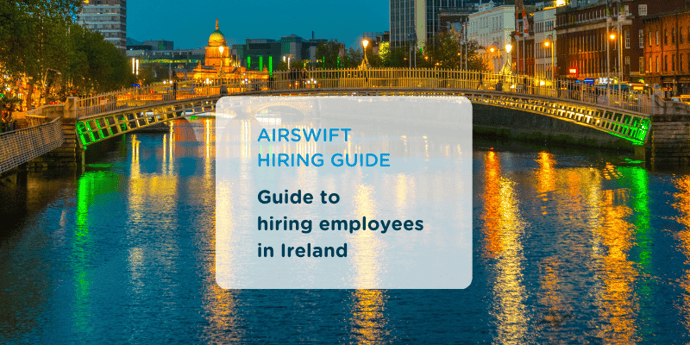
Overview
With a population of 4.9 million people, Ireland offers a talented and diverse workforce with over 50% holding a third-level degree, making it one of Europe’s most highly educated countries. This, combined with its modern and flexible employment law framework, creates an attractive business climate for both local and international companies.
It has a thriving technology sector and is home to many of the world's leading tech companies, including Facebook, Google, and Apple. The country's reputation for innovation and favourable business climate has helped establish it as a hub for technology and pharmaceuticals, two of its top industries.
Ireland's well-developed and sophisticated financial services industry combined with its favourable business climate and highly educated workforce has helped to establish it as a hub for international business and finance.
| Capital |
Dublin |
| Languages spoken |
English Irish Irish Sign Language Ulster Scots Northern Ireland Sign Language Shelta |
| Population size |
5.06 million as of 2023 |
| Payroll frequency |
Weekly/monthly |
| Currency |
Republic of Ireland – Euro (€) Northern Ireland - Pound sterling (£) |
| VAT |
23% |
Payroll and taxes
Employer contributions
In Ireland, employers are responsible for making several mandatory contributions as part of the payroll process. These include Employer PRSI (Pay-Related Social Insurance) contribution.
This contribution is a percentage of the employee's gross earnings and funds the country's social insurance program. The rate varies depending on the employment type and the employer’s size.
The current employer PRSI rate in Ireland is 10.75% for most classes of employers. However, there are different PRSI classes for employers, and the specific rate that applies to an employer will depend on the type of business and the number of employees.
For example, the PRSI rate for Class A employers (which includes most private sector employers) is 10.75%. In comparison, the PRSI rate for Class J employers (which includes employers in the fishing and agricultural industries) is 4.85%.
PRSI rates are subject to change, and employers should regularly check the Irish government's Revenue website for the most up-to-date information on PRSI rates and requirements.
Following are the summarised PRSI rates according to different work classes:
Employed by organisation
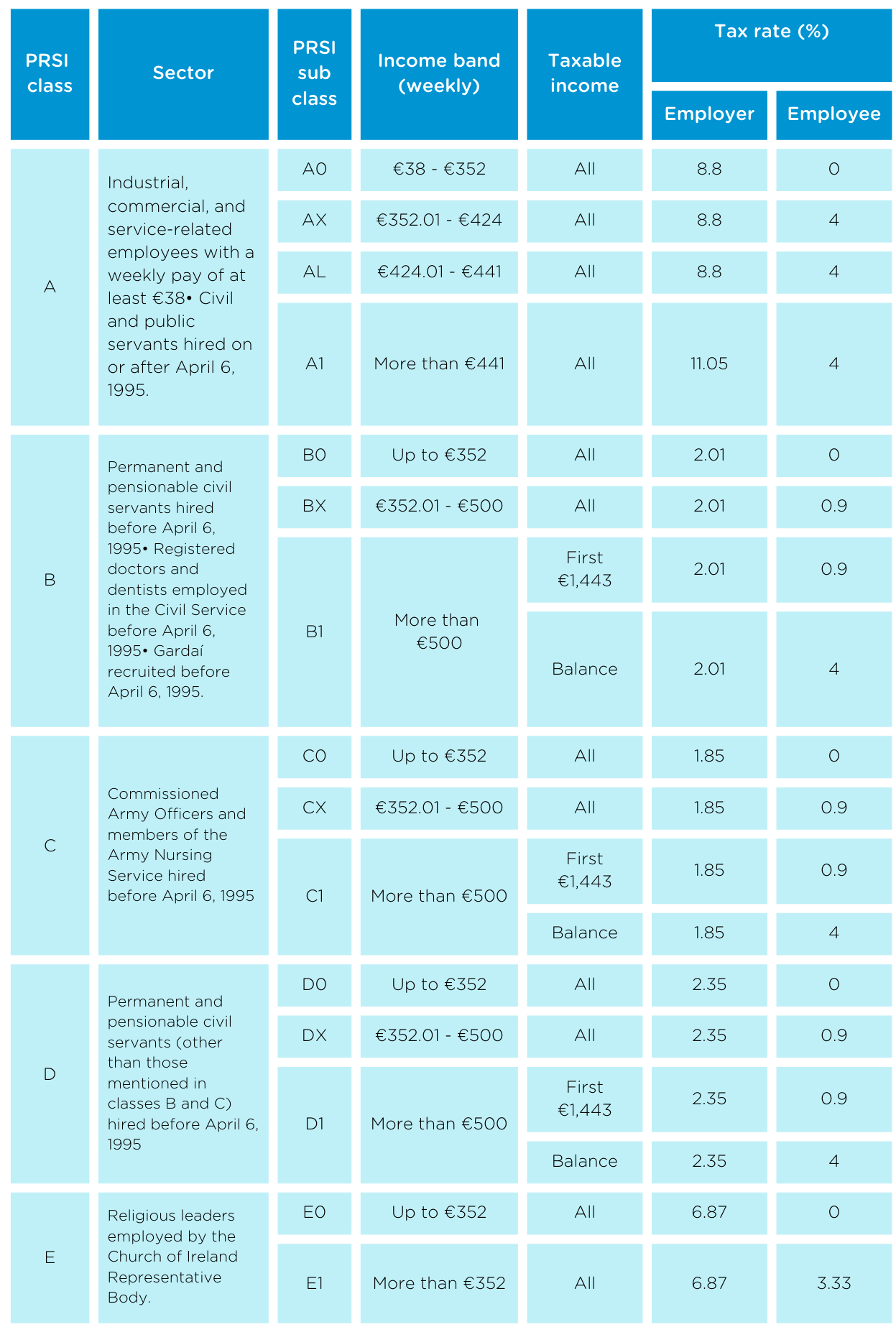
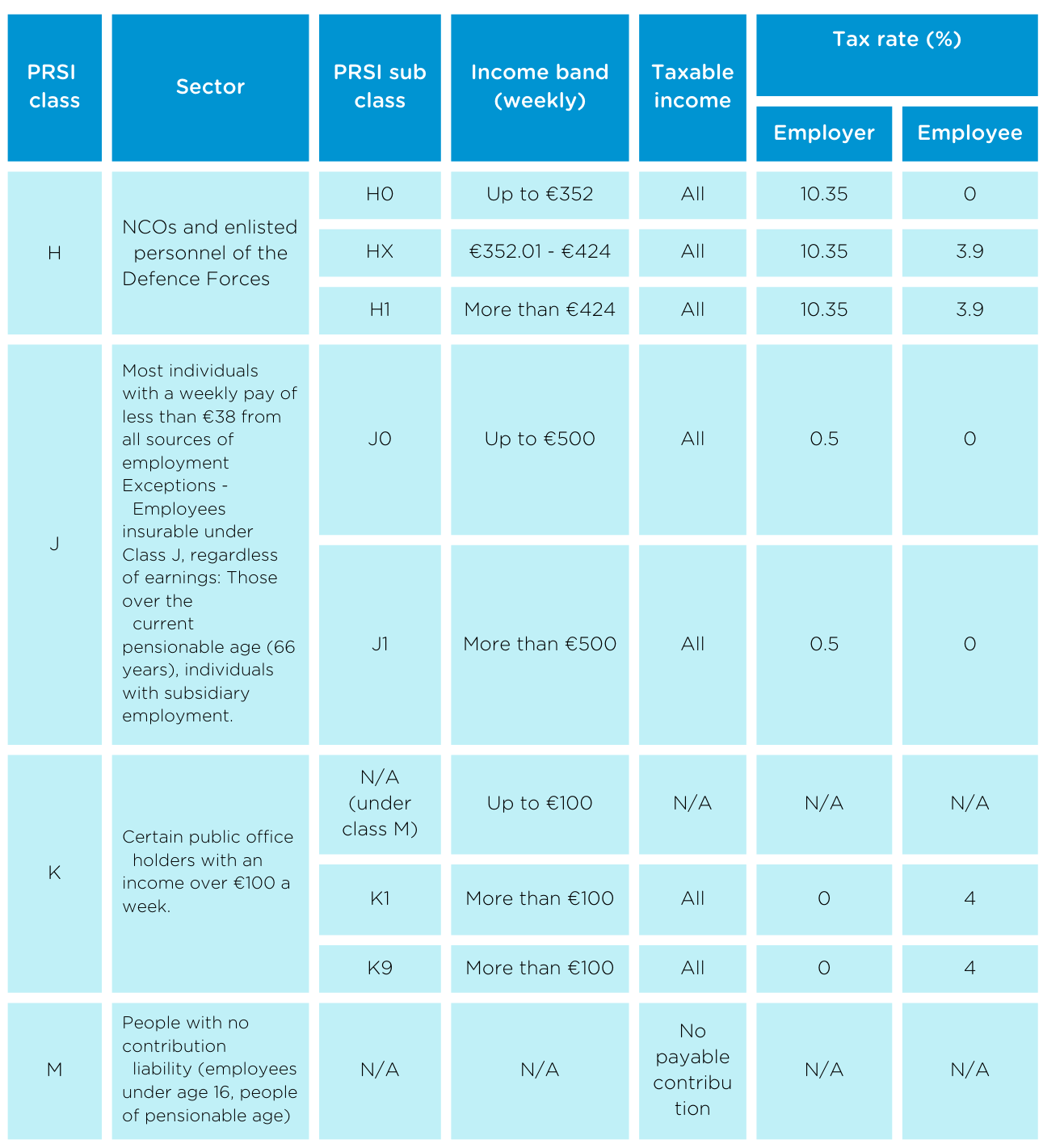
Table 1 & 2: PRSI classes for those employed by organisations
Self-employed


Table 3 & 4: PRSI classes for those who are self-employed
Pension contributions
Employers must provide a pension scheme for their employees and contribute to this scheme on their behalf.. The requirements for pension contributions depend on the type of pension scheme the employer has chosen to provide.
There are several types of pension schemes that employers can offer in Ireland, including defined benefit (DB) schemes, defined contribution (DC) schemes, and group personal pension (GPP) schemes.
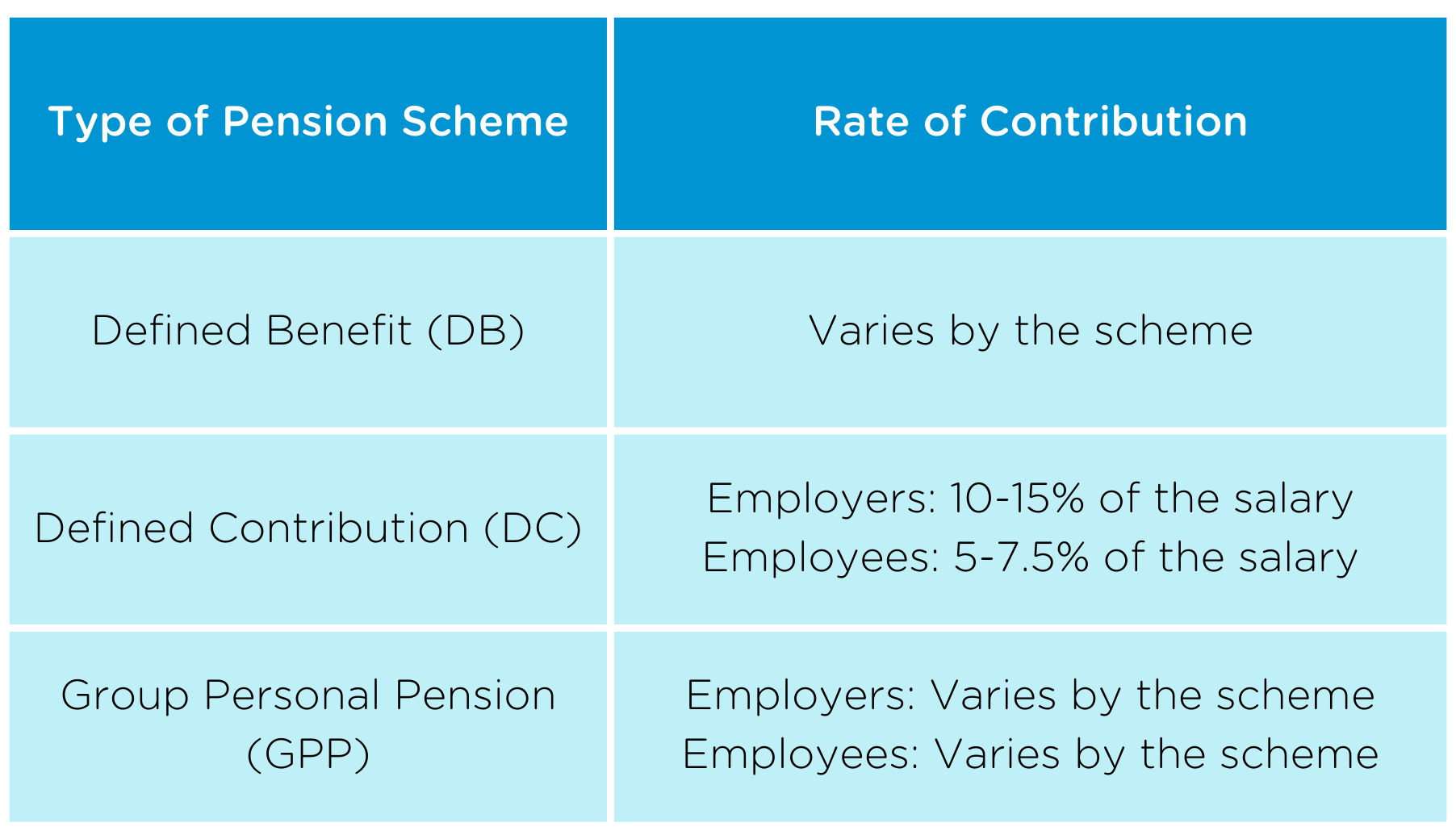
Table 5: Pension schemes in Ireland
Note: The contribution rate for Defined Benefit (DB) schemes can vary depending on the specific scheme and may be based on factors such as length of service, salary, and age. The rates listed for Defined Contribution (DC) and Group Personal Pension (GPP) schemes are general guidelines and can vary depending on the scheme and the employer's and employee's contributions.
Income tax
Employers are also responsible for deducting income tax from their employee’s pay and for remitting this tax to the government on behalf of their employees. The income tax deducted depends on the employee's income level and is calculated based on a progressive tax system, which will be explained in the next section.
Employee contributions
Employees have several payroll and tax obligations as part of the employment process. These obligations include:
Employee PRSI (Pay-Related Social Insurance) contribution
This contribution is a percentage of the employee's gross earnings and funds the country's social insurance program. Please take a look at the PRSI tables in the previous section for more details.
Income tax
Employees in Ireland are required to pay income tax on their earnings. The tax amount depends on their income level and is calculated using a progressive tax system.
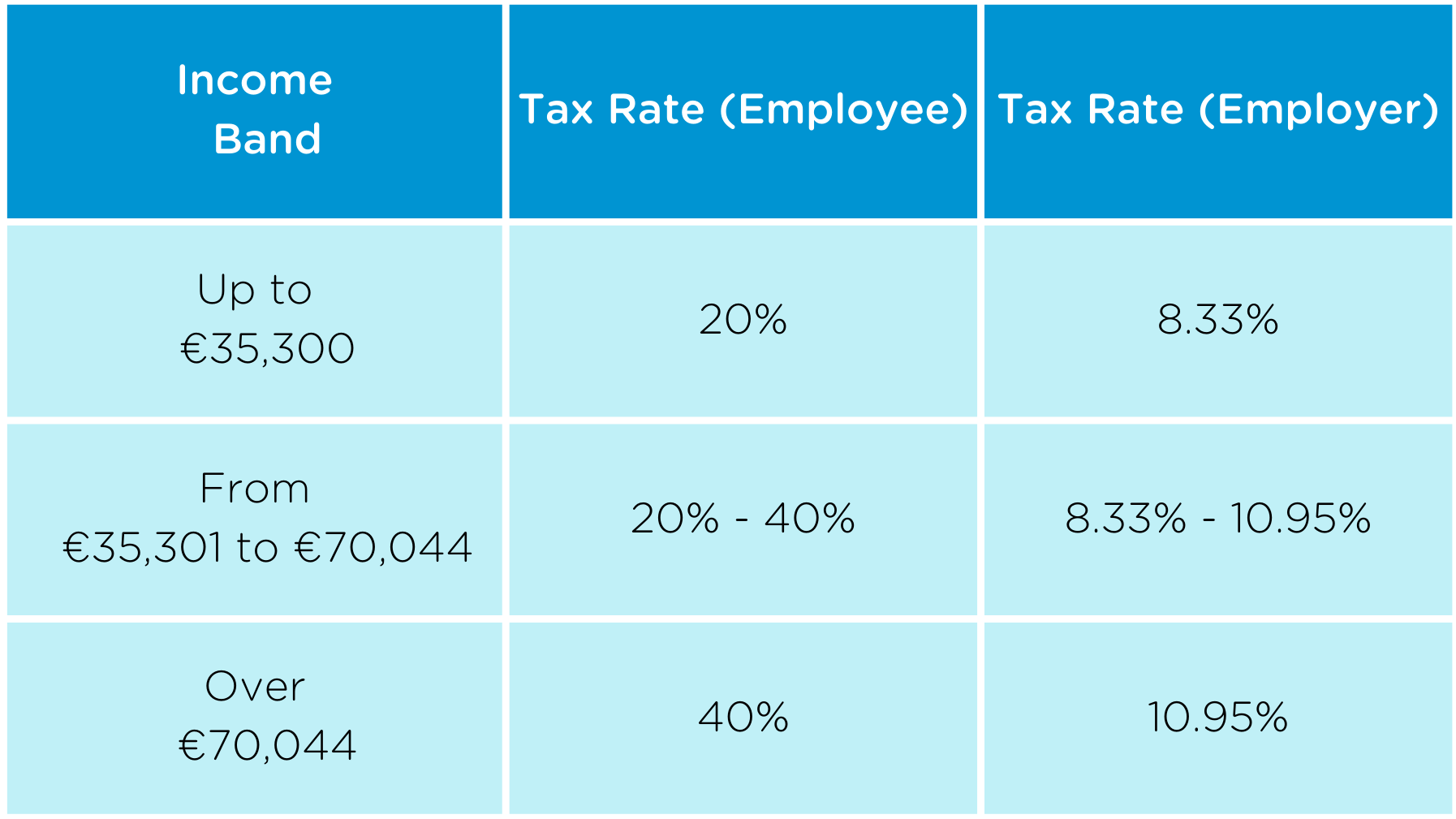
Table 6: Income tax rates
Universal Social Charge (USC)
The USC is a tax on an individual's income calculated based on a progressive tax system, and its rate depends on their income level. For incomes of €13,000 or less, there is no Universal Social Charge (USC).
Standard rates of USC (2023)
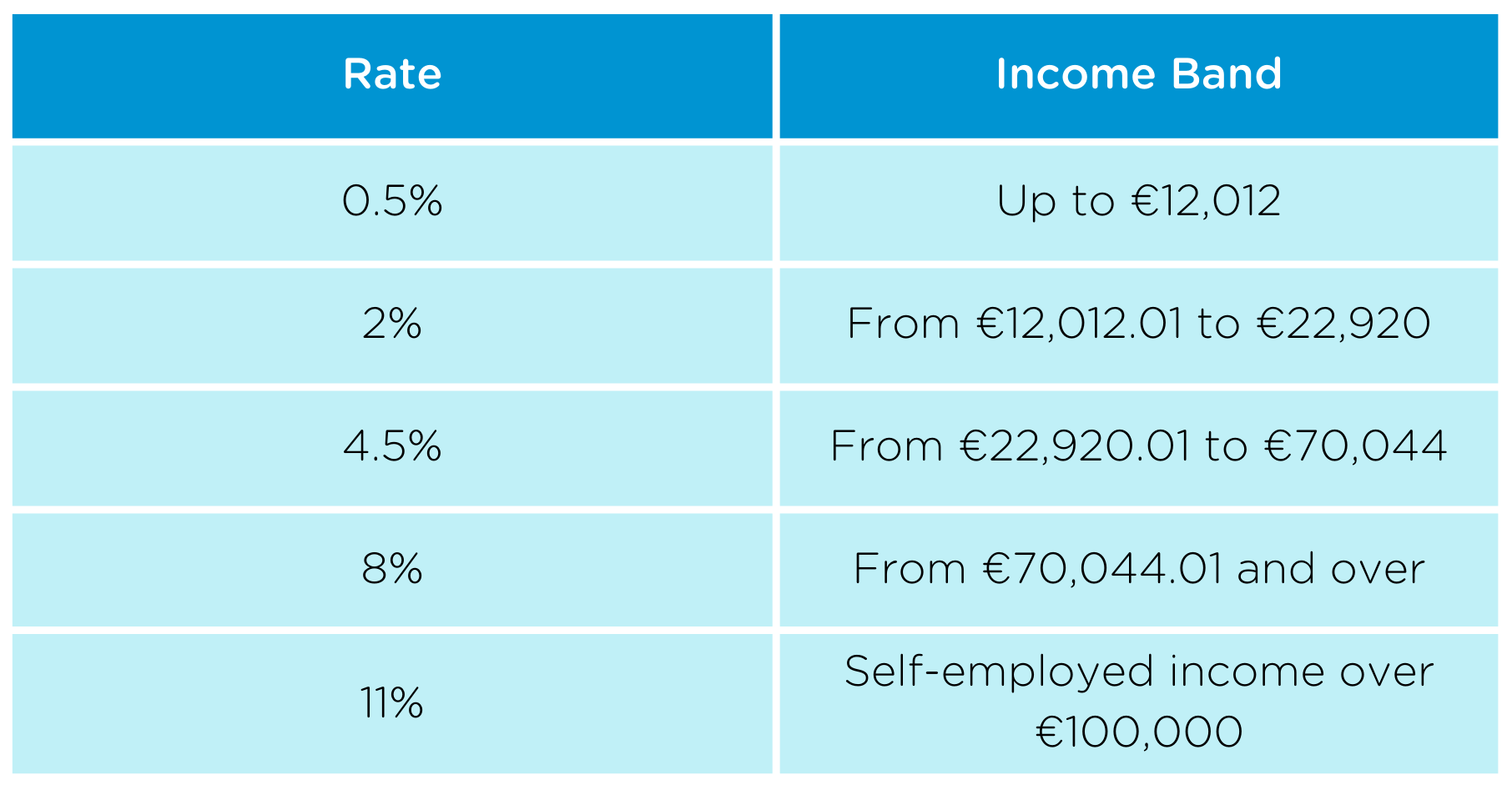
Table 7: Standard USC rates
Reduced rate of USC (2023)

Table 8: Reduced USC rates
Reduced rates of USC apply to:
- People aged 70 or over whose total income for the year is €60,000 or less
- Medical card holders aged under 70 whose total income for the year is €60,000 or less
Total income for USC purposes does not include payments from the Department of Social Protection.
Working hours
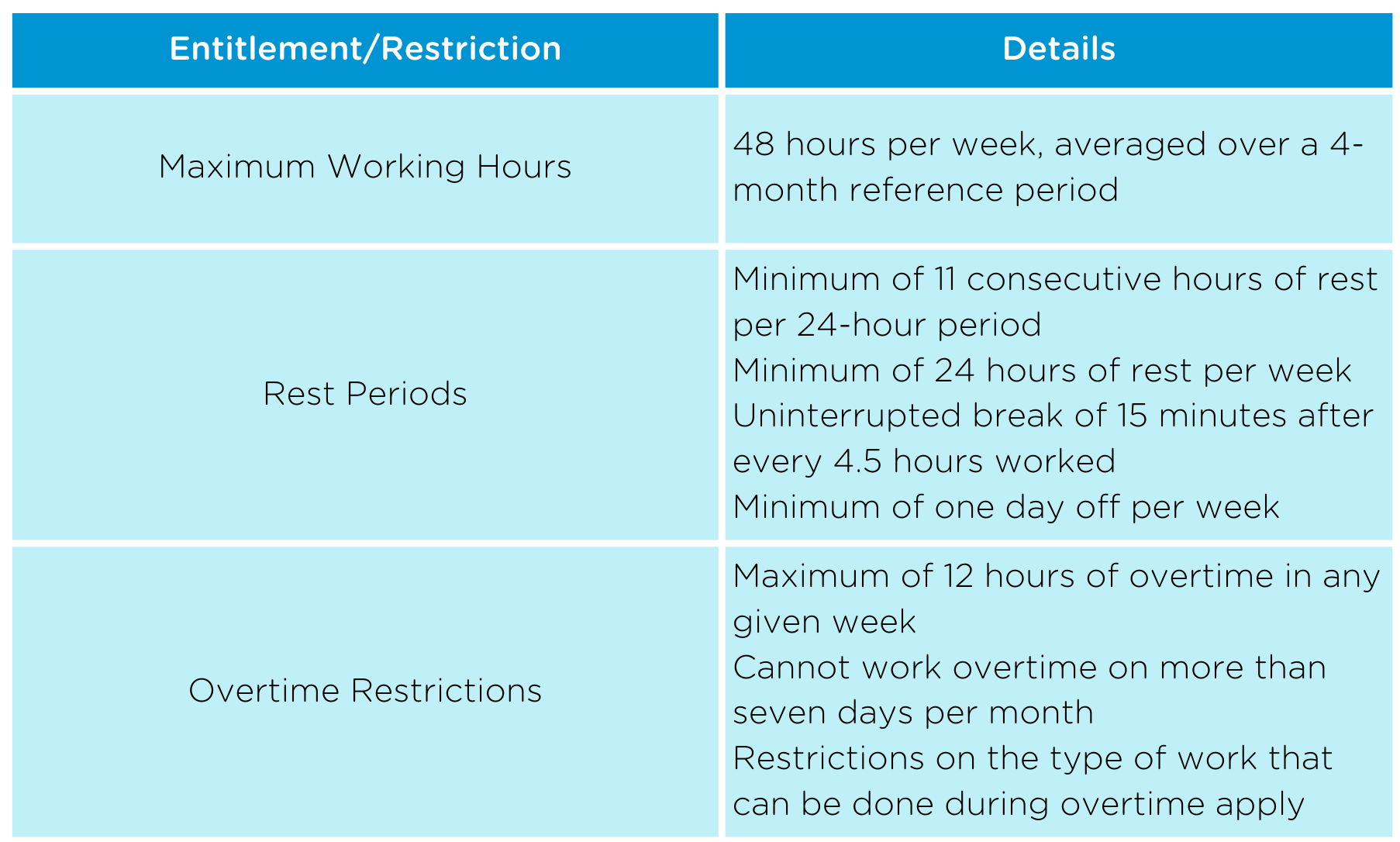 Table 9: Working hours in Ireland
Table 9: Working hours in Ireland
Minimum wage
In Ireland, the minimum wage is reviewed annually by the government, and it is currently set at €11.30 per hour for all employees over 18 to ensure fair compensation. Employers must pay their employees at least the minimum wage and can face penalties and fines if they fail to do so. Employees can claim underpayment through the Workplace Relations Commission.
Overtime pay in Ireland is typically higher than the employee's standard hourly rate and varies based on the employee’s employment contract terms. Some common overtime rates in Ireland are time and a half (1.5 times the employee's standard hourly rate) or double time (2 times the employee's normal hourly rate).
Employee benefits
Mandatory benefits
Employers must provide several mandatory employee benefits as part of the employment relationship. These benefits include:
Paid annual leave
Employees in Ireland are entitled to a minimum of 20 days of paid annual leave per year, although some employers may offer more generous leave entitlements as part of the employment contract.
Statutory sick pay
- From 1st January 2023, employees in Ireland are entitled to 3 days of sick pay per year.
- The sick pay provided by the employer is 70% of the employee's normal pay.
- The maximum amount paid per day is €110.
- Employees must have worked for their employer for at least 13 weeks before they can receive statutory sick pay.
- Employers can provide a more generous sick pay scheme, but they cannot provide less than the statutory amount.
Pensions
Employers must provide their employees with access to a pension scheme. However, the specific pension scheme and the level of contributions will depend on the terms of the employee's employment contract.
Supplementary/optional benefits
In addition to the mandatory benefits outlined above, many employers in Ireland provide their employees with a range of supplementary or optional benefits. These benefits can include the following:
Health insurance
Some employers offer health insurance as a benefit to their employees, which can help cover medical treatments and procedures costs.
Life insurance
Can provide financial protection for employees and their families in the event of the employee's death.
Private health care
Some employers offer private health care as a benefit to their employees, which can provide access to private hospitals and medical treatments.
Employee discounts
Many employers offer their employees discounts on products or services, including gym membership, travel, and more.
Bonus schemes
Some employers offer bonus schemes to their employees, which can provide additional financial rewards for meeting specific performance targets or working certain hours.
Types of leave available
Annual leave
- In Ireland, full-time employees are entitled to a minimum of four weeks of paid annual leave annually
- This entitlement is based on the employee's normal working hours and includes any regular overtime that the employee works.
- Part-time employees are entitled to a pro-rata annual leave based on their hours worked.
- Annual leave can be accrued pro-rata throughout the year or given as a lump sum at the beginning of the year.
- Employers can set the timing of annual leave but must consider the employee's preferences and business needs.
- If an employee leaves their job, they are entitled to be paid for any annual leave they have not taken.
- Employees can also take leave for public holidays, but there is no statutory entitlement to pay for this time off.
Note: Entitlement is based on standard working hours and includes regular overtime. Part-time entitlement is based on hours worked.
Public holidays
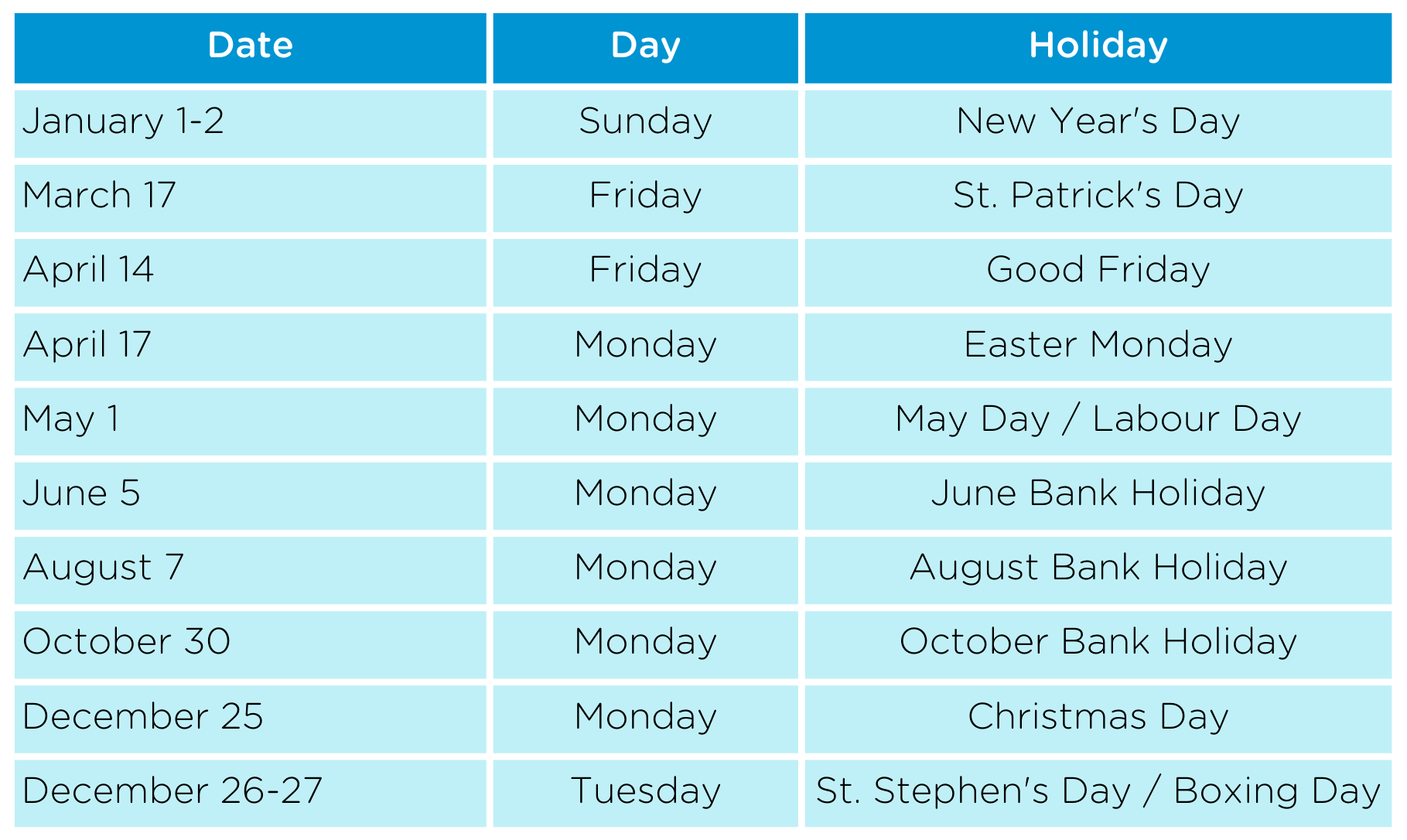
Table 10: Public holidays in Ireland
Note: The above list is subject to change and may be affected by government announcements.
Sick leave
In Ireland, employees are entitled to a certain amount of paid sick leave each year, depending on their length of service and the sick leave policy of their employer. The length of an employee’s sick leave will vary depending on their employment contract and company policies.
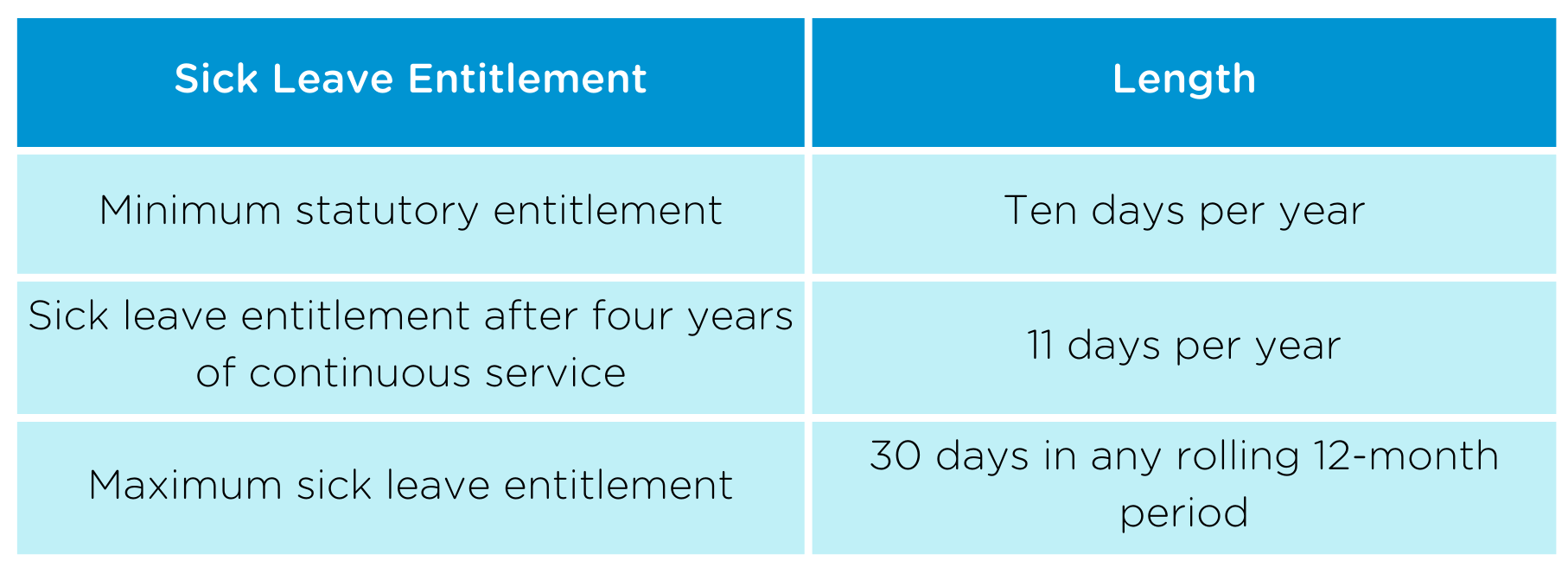
Table 11: Sick leave entitlement
Some employers may offer more generous sick leave entitlements as part of their employee benefits package. Reviewing the terms of your employment contract or company policies is essential to determine the sick leave entitlement that applies.
Maternity/paternity leave

Table 12: Maternity/paternity leave
- Parents who apply for additional unpaid parental leave are entitled to up to 26 weeks of leave per child until the child is 12 or 16 years old if the child has a disability.
- Employers may offer additional benefits beyond the statutory requirements, so employees should check with their employer to see if additional benefits are available.
Background checks
Background checks are optional in Ireland for all employees, but some employers may conduct them for specific circumstances. For example, employers in particular industries like finance, healthcare, or education may require background checks for employees in sensitive positions.
In Ireland, background checks can include various information such as criminal record checks, employment history checks, and credit checks. Employers must ensure that background checks are legal and fair and comply with data protection legislation, such as the General Data Protection Regulation (GDPR).
Attracting talent
Job opportunities and a growing economy
Ireland is a hub for international business, with many global companies choosing to establish their European headquarters in the country. This has led to a growing economy and abundant job opportunities across various sectors. The technology, finance, and healthcare industries are thriving, offering a range of positions at different levels of expertise.
High-quality education and a skilled workforce
Ireland has a strong reputation for high-quality education, with many of its universities ranked among the best in the world. The country is also home to a highly skilled workforce, with many graduates staying in Ireland to work or going on to secure jobs in other countries.
Network of international businesses and organisations
Ireland's strong economy and business-friendly environment have attracted many global companies to set up their European headquarters there. This has created a vast network of international businesses and organisations, providing professionals ample opportunities to connect and network.
High standards of living and quality of life
Offering a high standard of living, a well-developed healthcare system, a safe environment, and a range of leisure and cultural activities, Ireland is the ideal place for employment. The country's natural beauty and landscapes also attract outdoor enthusiasts and nature lovers, while the country's vibrant cities provide a range of entertainment options for urban dwellers.
The list above is considered some of the high-attraction factors that would attract and retain employees in Ireland. Organisations can also go one step forward in ensuring they stand out as the best employers by prioritising a positive work culture and offering competitive compensation and benefits packages.
Termination of employment
In Ireland, the termination of employment is governed by several rules and requirements, including severance pay, probationary periods, and notice periods. The following provides more specific details on each of these:
Severance pay
Under Irish law, employees who have worked for an employer for at least 104 weeks are entitled to severance pay if the employer terminates their employment. The amount of severance pay an employee is entitled to equal two weeks' pay for each year of service, with a maximum payment of €600.
Probationary period
The probationary period for employees in Ireland can range from six months to two years, depending on the terms of their employment contract. During this period, the employer can assess the employee's suitability for the role and terminate the employment without providing a reason.
Notice period
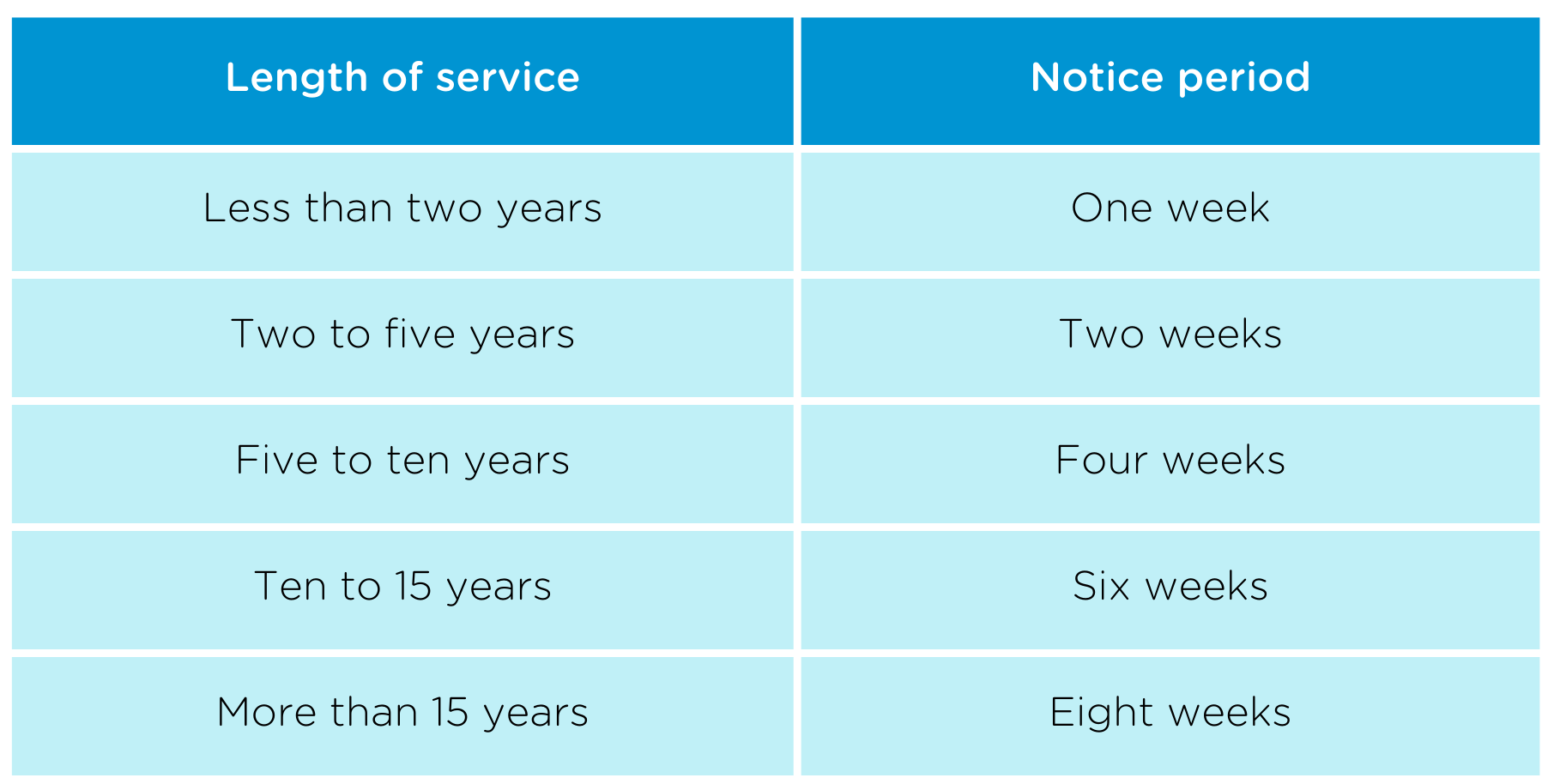
Table 13: Notice period in Ireland
What are my options for hiring?
Airswift provides various solutions to help businesses in Ireland in talent acquisition, ensuring compliance with local regulations. With our profound expertise and knowledge, we can mitigate the risks of hiring and onboarding top-notch professionals in Ireland.
By entrusting us with administrative tasks, you can concentrate on growing your business.
Talent acquisition
Growing a company comes with inherent risks, which is why having experienced and knowledgeable employees are crucial. Airswift offers the services of a local talent acquisition specialist to assist in finding top-notch candidates in a competitive market
We also provide contract hiring for short-term projects and flexible staffing solutions, ensuring that you don't have to compromise quality for urgent hiring needs. Our extensive database of highly skilled contractors guarantees that you'll find the best fit for your company.
If you're looking for a more permanent staffing solution, our professional recruitment services can connect you with the top talent in Ireland that meets your specific requirements.
Employer of record
If you are considering hiring employees remotely and don't want to go through the process of setting up a physical office, an alternative solution is to use an employer of record (EOR).
By using a third-party employer of record, you can avoid the complexities of establishing a local office and focus on running your business. The EOR takes care of responsibilities such as paying employees' wages and providing them with mandatory benefits.
*Although the information provided has been produced from sources believed to be reliable, no warranty, express or implied, is made regarding the accuracy, adequacy, completeness, legality or reliability of any information. For the latest information and specific queries regarding particular cases, please contact our team.


